牛津译林版高中英语模块1 Unit 1 School life 1 教学设计
牛津译林版英语高一上册Module 1《Unit 1 School life》word教案

I.单元教学目标The First Period ReadingThe Second Period Function and writingThe Third Period Listening and speakingThe Forth Period Language studyThe Fifth Period Integrating skillsThe Sixth Period WritingUnit 1 School life I. 单元教学目标II. 目标语言Ⅲ. 教材分析与教材重组1. 教材分析本单元以School life为话题,旨在通过单元教学使学生了解英国校园生活的一些基本情况及中英两国校园生活的不同之处;学习并能运用表示校园设施的一些基本词汇;学习定语从句的基本概念及关系代词的用法;能就校园活动的话题展开讨论;能就校园活动情况向班任老师做出报告;学习通知的写法;学会设计以介绍学校俱乐部为主题的海报等。
1.1 Welcome to the unit 部分利用四幅图片,分别从(校园风貌、生活设施、课堂教学、师生关系)四个不同的侧面介绍了英国校园生活的有关情况。
该部分还设计了三个讨论话题,引导学生对中英两国校园生活进行比较,并就相关话题发表自己的看法。
1.2 Reading部分的短文节选自一份校园杂志。
文章由一位交换留学生所写。
作者通过自己的亲身经历简要地介绍了英国学校生活的一些情况。
文章前后分别设计了五个部分的练习:前两个练习(A、B)要求学生运用本单元介绍的两种基本阅读方法(skimming and scanning)阅读文章,把握文章主旨大意,了解文中明显的细节内容;练习C1通过问题的形式考查学生对文中具体信息的把握程度;C2通过判断正误练习加深学生对阅读材料的理解;D部分为词汇练习,要求学生首先联系上下文猜测所给词汇的含义;然后通过配对练习帮助学生掌握新词的含义和用法;E部分要求学生通过运用所给词汇填空的方式完成一封英国学生写给Wei Hua的信件,以进一步加深学生对阅读内容的理解;练习F设计了两个话题,引导学生对校园生活有关话题展开讨论,以获得对文章深层次的理解。
牛津译林版高中英语模块1 Unit 1 School life Reading 教学设计
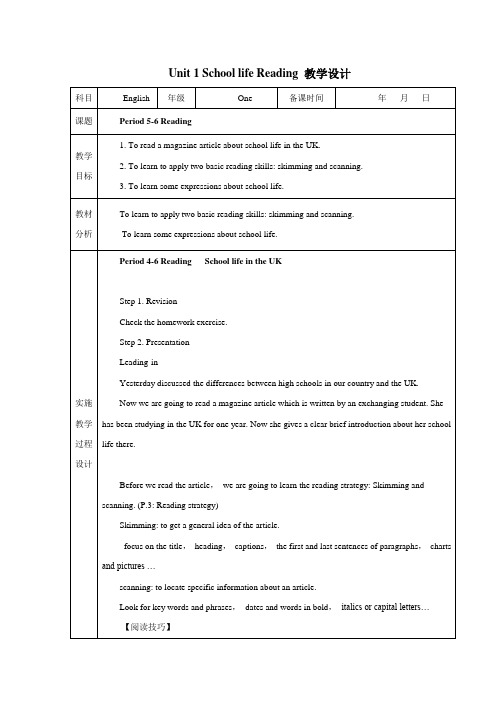
4. Preview the following lesson.)
Step 5. Practice:
Pair work
Now you are a reporter from the school magazine,and have a chance to interview Wei Hua. What other information would you like to know about her life and study in the UK?
Check the homework exercise.
Step 2. Presentation
Leading-in
Yesterday discussed the differences between high schools in our country and the UK.
Now we are going to read a magazine article which is written by an exchanging student. She has been studying in the UK for one year. Now she gives a clear brief introduction about her school life there.
focus on the title,heading,captions,the first and last sentences of paragraphs,charts and pictures …
【英语】牛津译林版高中英语必修一Unit1SchoolLifeword教案
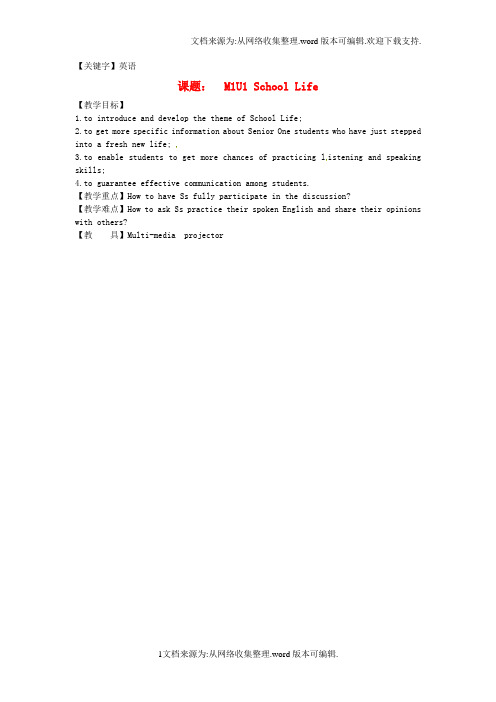
【关键字】英语课题: M1U1 School Life【教学目标】1.to introduce and develop the theme of School Life;2.to get more specific information about Senior One students who have just stepped into a fresh new life;3.to enable students to get more chances of practicing l istening and speaking skills;4.to guarantee effective communication among students.【教学重点】How to have Ss fully participate in the discussion?【教学难点】How to ask Ss practice their spoken English and share their opinions with others?【教具】Multi-media projector【教学过程】【二次备课】Step 1 Greeting and lead-inWelcome to our English class. I’m very glad to see you here.It’s the beginning of a new team you have just finished juniorschool and are about to enter a new period in your studies.In your opinion, what do you think of your school life?School life: excitement, challenges, success, laughter’s,tears, joys, sorrows, dreams, discoveries,failures.Step2welcome to the UnitT: High school is a time of discovery, learning and hard work.You should cherish the time and makeProgress every day. I can see you’re eager to know whatstudying at senior high will be like inChina?Is it different from other countries. Let’s compare them.In the British High SchoolIn the Chinese High School1.huge campus and low-rise buildinglarge campus and tall buidings2.locker for every studentnone has such equipment3. fewer students in each class 40-50-604. at ease with teachersbe friendly to each otherstep3 DiscussionT: Discuss the three questions on page1Can you dream of your school life? ( teacher? Students?Classmates?) what characteristics should theyhave?Teachers: fair, patient, learned, humorous, co-operative,energeticStudents: diligent, e nergetic, civilized, polite,competitive, co-operate, open-minded,strong-mindedT: very good. Teachers and students should cooperate with eachotherTeacher s hould love / learn from/ encourage/ understand/help/ respectT: only in this way. Can we make progress every day and achievesuccess. How can we achieve Success?(courage, belief, luck, diligence, perseverance,intelligence,confidence, competence,cooperation, wisdom, determination)T: like a scientist bent on making a discovery, we must cherishthe hope that one day we will rewarded.Some useful saying1.Life is a bumpy road.2.where there is a will, there is a way.3.Failure is the mother of success.Step4 Language points1.High school is a time of discovery, learning and hard work.抽象名词time, means, knowledge, collection, 在具体语境中,即后面有of短语或后接一个定语从句,前面要加不定冠词a/anThere was on ce a time when I hated to go to school.have a good knowledge of English 精通英语have a large collection of coins2.What are some differences between……?参考金榜直通P2补充:tell the difference between A and B= tell A from B 3.What is your dream school like?What is sth like? 某物是什么样的?What is sb like? 某人的(性格、外貌....)是什么样的?What does sb/ sth look like?某人(某物)看起来是什么样的?How is sth?某物的质量如何?How is sb?某人的身体怎样?补充:你觉得…..怎么样?How do you like/find ……?What do you think of ……?What do you like about ……?发散:like doing/ to do 喜欢做....Would ike to do 愿意做....feel like doing 想做.....Sound like 听起来像......【作业布置】【教学后记】此文档是由网络收集并进行重新排版整理.word可编辑版本!。
牛津译林版高中英语模块1 Unit 1 School Life grammar 导学案

Module1 Unit1 School Life Grammar 导学案【学习目标】1. Learn about what an attributive clause is and the functions of relative pronouns and relative adverbs used to introduce attributive clauses. (重点理解定语从句、关系代词和副词的含义)2. Master the different usages of relative pronouns. (关系代词的用法)【学习过程】1、自学质疑——讨论:(定语从句)一、基本概念(1) 定语从句:在复合句中作定语,修饰名词或代词的从句叫定语从句。
(2) 先行词:被定语从句所修饰的名词或代词。
一般情况下,定语从句紧跟先行词。
但也有因各种原因定语从句与先行词被分割的现象。
(3) 关系代词和关系副词:定语从句的引导词。
与先行词关系密切,因此紧跟先行词,并在定语从句中充当一个成分。
关系代词有:who, whom, which, that和whose,另外,as也可充当关系代词。
关系代词在定语从句中充当主语、宾语、表语和定语。
关系副词有:when, where和why。
在定语从句中充当状语。
二、关系代词的用法1、基本用法:根据先行词的不同,和在从句中所充当的成分不同,选用不同的关系代词。
如下表:例如:(注意关系代词在定语从句中所充当的成分)①Do you know the professor who/that will give us a speech next week?(作主语)②I read a report about his new novel that/ which will soon be published. (作主语)③The plan that/which they argued about was settled at last. (作宾语)④This is the new secretary (who/whom/that) I would like to introduce to you. (作宾语)⑤The soldier whose legs were badly wounded was operated on without delay. (作定语) 注意:关系代词在定语从句中充当宾语时可以省略,充当主语时则不能。
【同课异构】高一英语(牛津译林版)必修一教案 unit1 School life welcome to the unit

Welcome to the unit 教案Step 1T: Welcome to our school.It’s the beginning of a new term. You have just finished junior high and are about to enter a new period in your studies. I am very happy to have all of you in my class and I hope we can be friends..I am your English teacher this year.First of all,allow me to introduce myself to you. My first name is Zong.So you can call me Mr Zong or Teacher Zong.I like playing computer, listening to music and reading in my free time.In a word, I like my job teaching very much.I do hope to have a good time with you.T: Just now I introduced myself to you.Now I want to ask some of you to introduce yourself to us.Any volunteers? What’s your name? S1: My name is... T: Do you have any hobbies? S2:I like ...T: Which school did you graduate from? S3:I came from No.1 Middle school.T:your name,please? S4:My name.....T:Which school are you from?S5:....active learningenjoy losing facerenew学习习惯1、课前预习课后复习不算作业,是一种习惯。
牛津译林版高中英语必修一《Unit 1 School life》 Reading 教学设计 1
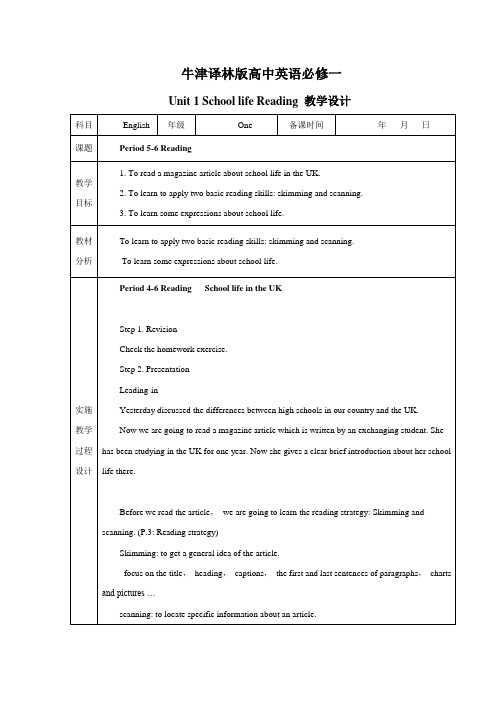
Pair work
Now you are a reporter from the school magazine,and have a chance to interview Wei Hua. What other information would you like to know about her life and study in the UK?
Do any of you happen to have had the chance to go on a tour in the UK or have taken part in some exchanging programmes?Please bring some photos to school to pass them around and make brief descriptions of the photos. You can use the information to discuss the difference and try to think of the reasons for these differences.
B. what the headmaster told them sounded like what she used to hear in her school in China.
C. she was such a good cook that she liked cooking British food. D. She didn’t like History or Art,so she chose Woodwork.
Step3: Fast reading for general ideas
Unit1SchoolLife(译林牛津版高一英语必修一教案教学设计)

Unit1SchoolLife(译林牛津版高一英语必修一教案教学设计)Textual Analysis:This unit introduces and develops the theme of school life.(1) In Welcome to the unit, students are presented with four different aspects of school life in the UK and are asked to compare the differences between high schools in the UK and in China. The reading text School life in the UK deals with an article from a school magazine on school life in the UK.(2) Word power talks about school facilities;(3) In grammar and usage, students are required to learn the Attributive Clause--- the usages of “that, which, who, whose, whom”.(4) Task deals with reporting school activities. In the Project section, students will learn how to design a poster.Teaching aims:Encourage the Ss to learn the following(1) Vocabulary: words and phrases(2) Grammar: the Attributive Clause--- the usages of “that, which, who, whose, whom”(3) Skills of reading a magazine(4) Culture: school life; school activities; after-school activities; schoolclubsImportant points & difficult points:The Attributive Clause; Making a projectTeaching aids:computer; tape-recorderInteractive patterns:teacher-class; pairs; groupsTeaching methods:Audio-visual method; Direct method; Functional approach Teaching process:Welcome to the Unit: (0.5 period)(1) Warming up questions(2) Talk about the pictures(3) More questionsReading: (1.5 periods)(1) Lead-in(2) First reading(3) Further reading(4) Text Check(5) Notes/language points(6) ExercisesGrammar (task-teaching method) (2 periods)(1) explanation(2) exercisesWord power (1.5 periods)(1) text learning(2) more exercisesProject (1.5periods)(1) text learning(2) more practiceSelf-assessment (1 period)/Test (1 period)Periods:Welcome to the Unit: (0.5 period)(1) Warming up questionsa. What school were you at last term?b. Why did you choose our senior high school?c. Are there any differences?(2) Talk about the picturesa. Huge campus and low-rise buildingsb. Lockers for every studentc. Fewer students in each classd. At ease with our teacher(3) More questionsa. Do you know of any other differences between the lives of Chinese and British high school students?b. What kind of school activities do you enjoy?c. What is your dream school life like?预习专练I.请根据句意填写适当的单词1. Going to a foreign high school for some time is very ________(开心) and exciting.2. Almost no high school students are ___________ (满意)with the school hours in China.3. I know from my own ____________(经历) how difficult this kind of work can be.4. I felt lucky as all my teachers were very ___________ (有助)and I enjoyed all my subjects.5. Sometimes I played football with the boys. Sometimes I just ________ (放松)under a tree or sat on the grass.6. George Bush was invited to a__________ the APEC held in Shanghai.7. My English i_________ a lot as I used English every day and spent an hour each day reading English books in the library.8. The paintings that David d__________ to the school are being displayed in the assembly hall.9. Though it didn’t look l________ a table when it was finished, I still liked it very much.10. British people eat lots of desserts after their m_________ meal.Reading: (1.5 periods)(1)Lead-inHow long did Wei Hua stay in Britain?What was the name of Wei Hua’s class teacher?What did Wei Hua make in her Woodwork class?(2) First readingExercises: (P4)C1/C2(3) Further readingMake an interview.S1-S2(Wei Hua)Write an article about the differences between high schools in the UK and in China.(4) Text CheckGoing to ____ British high school for one year was ____ very enjoyable and exciting experience for me. I was very happy ______the school hours in Britain because school ______ around 9 a.m. and ends about 3.30p.m. This means I could get up an hour later ________ as schools in China begin before 8 a.m. On the first day, all students went to attend _______ assembly. I sat _______ a girl _______ name was Daniel.We soon became best ______. The best way ______ ____respect from the school was ______ hard and achieve high grades. This sounded ______ my school in China. I _____ many teachers in the past year and they each taught only one ________. Miss Burke was the teacher ______ taught us English literature. This is about the ________ size for British schools. We had to _______ different classrooms _____ different classes. I found the homework was not as _____ as ____I used to get in my oldschool, but it was a little ________ for me at first because all my homework was ____ English. I felt lucky as all my teachers were _________ and I enjoyed all my subjects. My English _______ a lot as I used English every day and spent an hour each day _____ English books in the library. I usually e-mailed my family and friends back home _____ at lunchtime. I also had an _____ French class ____ Tuesday evenings. Cooking was really ___ great fun as I learned how to buy, prepare and cook food. At the end of the term we ____ a class party and we all had to cook something.(5) Notes/language points重点词汇解析attend v. 参加原句在线:__________________________________________________________________ According to the law in China, all children between 6 and 14 must attend school. 根据中国法律,六到十四岁的儿童必须上学。
牛津译林版高中英语必修一Unit 1《School Life》(Word power)教案
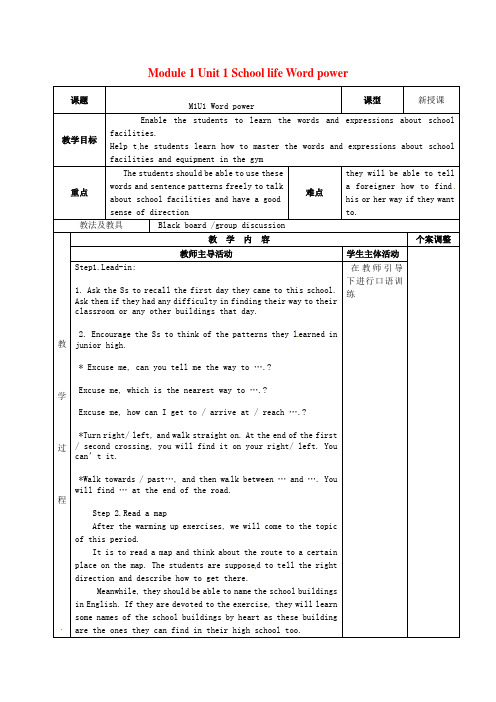
The students should be able to use these words and sentence patterns freely to talk about school facilities and have a good sense of direction
难点
they will be able to tell a foreigner how to find his or her way if they want to.
Show the route on the map.
Then, teach ers can give the students several minutes to prepare for the description. They can be divided into several groups and talk about the route in groups. The students will be in the front before the map to present their work.
Excuse me, how can I get to /arrive at / reach….?
*Turn right/ left, and walk straight on. At the end of the first / second crossing, you will find it on your right/ left. You can’t it.
After several practice, the students are able to name some of the buildings in English. Th en we can ask them to finish part B on page 6.
牛津译林版高中英语必修1教案Unit 1 School life1
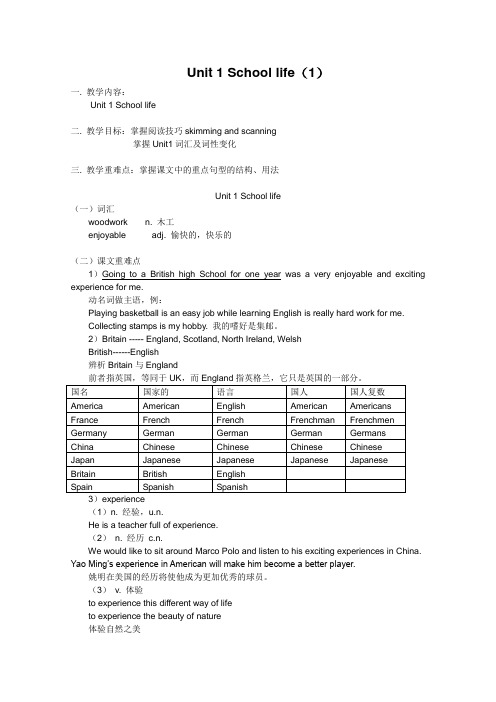
Unit 1 School life(1)一. 教学内容:Unit 1 School life二. 教学目标:掌握阅读技巧skimming and scanning掌握Unit1词汇及词性变化三. 教学重难点:掌握课文中的重点句型的结构、用法Unit 1 School life(一)词汇woodwork n. 木工enjoyable adj. 愉快的,快乐的(二)课文重难点1)Going to a British high School for one year was a very enjoyable and exciting experience for me.动名词做主语,例:Playing basketball is an easy job while learning English is really hard work for me.Collecting stamps is my hobby. 我的嗜好是集邮。
2)Britain ----- England, Scotland, North Ireland, WelshBritish------English辨析Britain与England3)experience(1)n. 经验,u.n.He is a teacher full of experience.(2)n. 经历c.n.We would like to sit around Marco Polo and listen to his exciting experiences in China. Yao Ming’s experience in American will make him become a better player.姚明在美国的经历将使他成为更加优秀的球员。
(3)v. 体验to experience this different way of lifeto experience the beauty of nature体验自然之美联想1:experienced adj. an experienced teacher联想2:experiment n. 实验。
模块1unit1schoollife(语法)(译林牛津版高一英语必修一教案教学设计)

模块1 unit 1 school life (语法)(译林牛津版高一英语必修一教案教学设计)总课题:U1 课时:主备人:lilyyao课型:Grammar 授课时间:教学目标: Introduce attributive clause教学重点:The basic usage of the relative pronouns and learn to use them in different situations.教学难点:How to help the students to learn the Attributive Clause efficiently.教学过程:Step 1.Revision:Check homework.Step 2. PresentationLook at the picture at page8 and ask the students to speak out what they may think of.(Write down these three structures on the Bb or show them on the screen below the picture.) Adjective: a green teamPrepositional phrase: a team in greenAttributive clause: a team who were wearing greenAttributive clause modifies a noun in the same way as adjective or prepositional phrase does. The noun it modifies is called an antecedent.Read Part2 at page8. Attributive clauses are usually introduced by relative pronouns like which, that, who, whom, and whose, or relative adverbs like where, why and when. In the clause these relative words usually function as the following: (page8)Step3Read the article at page9 and underline the attributiveclauses you find in the article.Relative pronouns: that, which, who, whom and whose. Read this part at page10 and grasp the usages of these relative pronouns.(show the screen) Then do the exercise at page11.Step 4.Introudction1. 语法术语及基本概念:(1). 先行词: 被定语从句所修饰的那个词。
高一英语(译林牛津版) 必修一教师用书 Unit1 School life
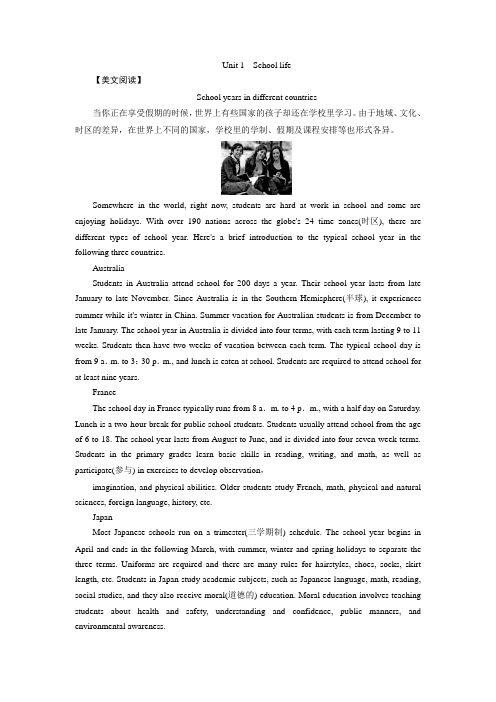
Unit 1School life【美文阅读】School years in different countries当你正在享受假期的时候,世界上有些国家的孩子却还在学校里学习。
由于地域、文化、时区的差异,在世界上不同的国家,学校里的学制、假期及课程安排等也形式各异。
Somewhere in the world, right now, students are hard at work in school and some are enjoying holidays. With over 190 nations across the globe's 24 time zones(时区), there are different types of school year. Here's a brief introduction to the typical school year in the following three countries.AustraliaStudents in Australia attend school for 200 days a year. Their school year lasts from late January to late November. Since Australia is in the Southern Hemisphere(半球), it experiences summer while it's winter in China. Summer vacation for Australian students is from December to late January. The school year in Australia is divided into four terms, with each term lasting 9 to 11 weeks. Students then have two weeks of vacation between each term. The typical school day is from 9 a.m. to 3:30 p.m., and lunch is eaten at school. Students are required to attend school for at least nine years.FranceThe school day in France typically runs from 8 a.m. to 4 p.m., with a half day on Saturday. Lunch is a two-hour break for public school students. Students usually attend school from the age of 6 to 18. The school year lasts from August to June, and is divided into four seven-week terms. Students in the primary grades learn basic skills in reading, writing, and math, as well as participate(参与) in exercises to develop observation,imagination, and physical abilities. Older students study French, math, physical and natural sciences, foreign language, history, etc.JapanMost Japanese schools run on a trimester(三学期制) schedule. The school year begins in April and ends in the following March, with summer, winter and spring holidays to separate the three terms. Uniforms are required and there are many rules for hairstyles, shoes, socks, skirt length, etc. Students in Japan study academic subjects, such as Japanese language, math, reading, social studies, and they also receive moral(道德的) education. Moral education involves teaching students about health and safety, understanding and confidence, public manners, and environmental awareness.From:http://www.factmonster. com【诱思导学】1.What is the difference between our school year and theirs?【答案】We have different terms. There are usually two terms in our school year while in both Australia and France, they have four terms and Japan has three.2.Do you think our present school year is good or not, and why?【答案】It is hard to say good or bad because different countries lie in different time zones, they enjoy different holidays and different schools.3.Do you want to know the school life in the UK?Why or why not?【答案】Yes. Because the school life in the UK interests me very much./No. Because I have no interest in the school life there. It's none of my business.Period ⅠPreviewing(教师用书独具)●教学目标本课时主要是通过学生对学案所给出的内容的学习,了解本课文中所出现的词汇,初步了解课文以及相关的背景知识,对下一堂课课文的全面理解起到一个铺垫作用。
译林牛津版高一英语必修一unit1schoollife教案
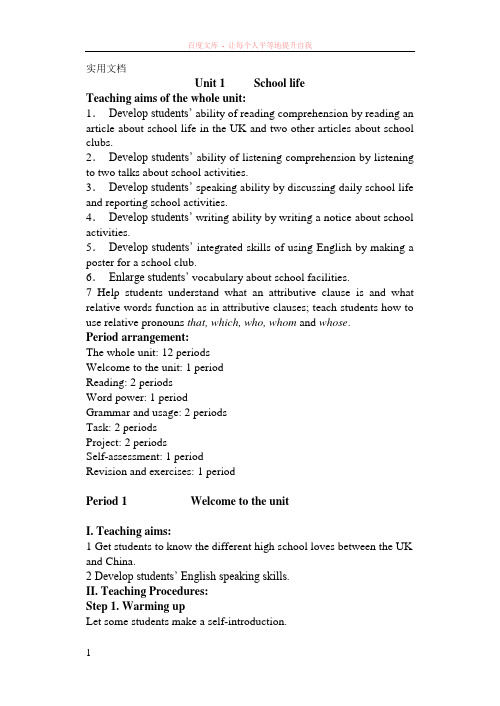
Unit 1 School lifeTeaching aims of the whole unit:1.Develop students’ ability of reading comprehension by reading an article about school life in the UK and two other articles about school clubs.2.Develop students’ ability of listening comprehension by listening to two talks about school activities.3.Develop students’ speaking ability by discussing daily school life and reporting school activities.4.Develop students’ writing ability by writing a notice about school activities.5.Develop students’ integrated skills of using English by making a poster for a school club.6.Enlarge students’ vocabulary about school facilities.7 Help students understand what an attributive clause is and what relative words function as in attributive clauses; teach students how to use relative pronouns that, which, who, whom and whose.Period arrangement:The whole unit: 12 periodsWelcome to the unit: 1 periodReading: 2 periodsWord power: 1 periodGrammar and usage: 2 periodsTask: 2 periodsProject: 2 periodsSelf-assessment: 1 periodRevision and exercises: 1 periodPeriod 1 Welcome to the unitI. Teaching aims:1 Get students to know the different high school loves between the UK and China.2 Develop students’ English speaking skills.II. Teaching Procedures:Step 1. Warming upLet some students make a self-introduction.1. Introduce themselves.2. Say something about their junior high school life.3. Pair work: brain storm:When we are talking about our school life, what will we probably think of?What words or phrases will we use to describe our school life? Step 2 Presentation1.Say the following to students:It’s the beginni ng of the new term. You’ve just finished your junior high and are about to enter a new period in your studies. I am happy to give your lessons and I hope we can be friends.I can see that some of your are eager to know what studying at senior high will be like. Will it be differ4ent from junior high? Well, there are certainly many differences between junior high and senior high, but there are also some things that are the same in every school in China. What about schools in other countries? Do you have different experiences? Are schools all over the world the same? This is the subject of our first unit.2. Ask students to read the instruction and tell them:Here are three pictures that show some aspects of school life in the UK. Please read the instructions, look at the pictures: what's the difference between schools in China and the UK?Step 3 Discussion1 Ask students the following questions to talk about the words in the four pictures:Huge campus and low-rise buildingsWhat does huge mean?What does low-rise mean?What about campus and school buildings in China?(Schools in China usually have a large enough campus to make sure students have enough space to study and play. But most school buildings have at least 3 storeys.)Lockers for every studentDo you know what a locker is?(There are rows of lockers by the classrooms for students to put their bookd, exercise-books and other belongings.)What do you think about locker for students?Do you think that we should have such locker in our school? Why or Why not?Fewer students in each classHow many students are there in our class?Do you know the number of students in a class in the UK?At ease with our teacherWhat can we know from this picture?What does the word ease mean? What do you think the phrase at ease mean?Were you getting on well with the teacher when you were in junior high?What relationship do you want to have with your teachers in senior high?2 Ask students to work in groups to talk about the four pictures and the differences between schools in the UK and China. Then ask several students to report their discussion to the whole class.aspects In the UK In ChinaHuge campus and low-rise buildings We can see hugecampus andlow-rise buildings.It is the biggestdifference fromschools in ChinaSchools in China usually have alarge enough campus to make surestudents have enough space tostudy and play in.But most school buildings aretaller, at least three storeys.Lockers for every student There are rows oflockers by theclassrooms forstudents to put theirstationary, books,exercise-books andother belongings.Students bring what they need forlessons to school and then take itall back home after school. Mostschools in china do not haveequipment in the classroom.Fewer students in each class There are fewerstudents in a class,no more than 30 perThere are usually more students inhigh school, perhaps 40 to 50 perclass. Recently some schools areclass. beginning to limit the number ofstudents in each class.At ease with our teacher Students have aclose relationshipwith their teachers.They feel at easeand comfortablewith them.It is similar in china. Nowadays,lots of teachers and students haveestablished a good relationshipwith each other. They respect eachother and work to gain a betterunderstanding of each other.3. Ask students to discuss the three questions in pairs, and them ask some of them to report their answers to the questions to the whole class.What is your dream school life like?What kind of school activities do you enjoy?What do you think of your life here in the new school?Step 4 Summary and HomeworkToday we’ve mainly talked about the differences between the high school lives in the UK and in China. After class you should:1) Recall all the new words and expressions that we learn in this lesson.2) Find more about any other differences between the high school lives in the UK and in China, either by surf the Internet or by reading some articles in newspapers or magazines.3) Preview the following part: reading (page 2 to page 4).Period 2 Reading (1) School life in the UKTeaching aims:1. Get students to know what school life is like in a high school in the UK.2. Develop students’ ability of reading comprehension through:1)skimming and scanning.2)Guessing the meanings of some new words from the context3. To learn some expressions about school life.Teaching procedures:Step 1 Lead-in and PresentationSay the following to the students:Yesterday we’ve talked about the differences between the high school lives in the UK and in China. We know well about the high school lives in China, because we are Chinese. But we know a little about the high school lives in the UK. Yeah? Today we are going to read a magazine article which is written by an exchanging student. She has been studying in the UK for one year. Now she gives a clear brief introduction about her school life there.(Bb: School life in the UK) Before we read the article, we are going to learn the reading strategy: skimming and scanning.Please look at page 3: Reading strategy. (Bb the following while learning the reading strategy. )Skimming: to get a general idea of the article, without studying it in detail.Focus on the titles, headings, the first and last sentences or paragraphs, charts and pictures …scanning: to find certain information in an article quickly.Look for key words and phrases, dates and numbers, etc.Step 2. Reading1. Skimming:Question: How does Wei Hua feel about her life in the UK?2. Scanning:1)Ask students to go through the three questions in part A and makesure that each of them know the meaning of each question.(AWoodwork class is a class in which students make somethingfrom wood.)Ask students to read the passage as quickly as possible and try to find answers to the three questions. Remind students only tofocus on and identify the most important information.2)Ask student to reread the passage and complete Part C1individually. Then ask some of them to give the answers to thequestions in Part C13)Ask students to finish Part C2 individually. Then get somestudents to share their answers with the whole class. Ask them to say the true sentences to correct the false ones.3 GuessingAsk students to finish Part D individually. Tell them not to look up the meanings of the words from the wordlists in the textbook. Let themguess the meanings from the context. Then check the answers with the whole class.Step 3 New Words in this UnitStudy the new words appears from page2 to page 5 (from attend to immediately) at page 68.Step 4. Homework.1. Complete part E on page 5.2. Read the two articles in reading on pages 82 and 83 in wb and answers the questions below them.3. Learn all the new words we learned today by heart.Period 3 Reading (2) School life in the UKTeaching aims:1 Help students become more familiar with the article.2 Develop students’ ability of reading comprehension by finding out what topics are covered in the article.3 Develop students’ ability of speaking by discussing the subjects they like in school.Teaching Procedures:Step 1. Revision:Check the homework:1)Have a dictation to go over the words learned last period.2)Check the answers in reading on pages 82 and 83 in wb.3)Ask some students to read the article in Part E to check whetherthey have used the suitable word in each blank.Step 2 Reading1) Ask some students to read the article aloud paragraph by paragraph. Ask other students to find out what topics are covered in it.School hoursSchool assemblyTeachersClass sizeDifferent classes in different classroomsHomeworkSubjects and favourite subjectsWhat to do at lunchtimeBritish food3)Ask students to point out the different high school lives in the UKand in China in these topics.Step 3 DiscussionLet students look at Part F together and discuss the questions in Part F in Pairs. Then get some pairs to act out their discussion in class.Step 4 Language focus1 Ask students to find out the following words, phrases and sentences in the article. Then give some explanations.Words:a)as (since, because, for)b)attend (join, join in, take part in)c)prepared)experiencee)respectf)exciting, excitedg)dropPhrases:a)for freeb)be happy withc)used to do sth.; be/get used to do sth.; be/get used to doing sth.d)the way to do; the way of doing; the way + Attributive Clausee)at the end of; in the end; by the end off)as … asSentences:a)Going to a British school for one year has been a very enjoyableand exciting experience for me.b)I do like eating.c)We also had different students in some class, so it was difficult toremember all the faces and names.2 Ask students to put the following sentences into English in their exercise-books.1) Jim 加入了我们的讨论之列。
新牛津译林版高中英语必修一unit 1《school life》school life in the uk优秀教案(重点资料).doc
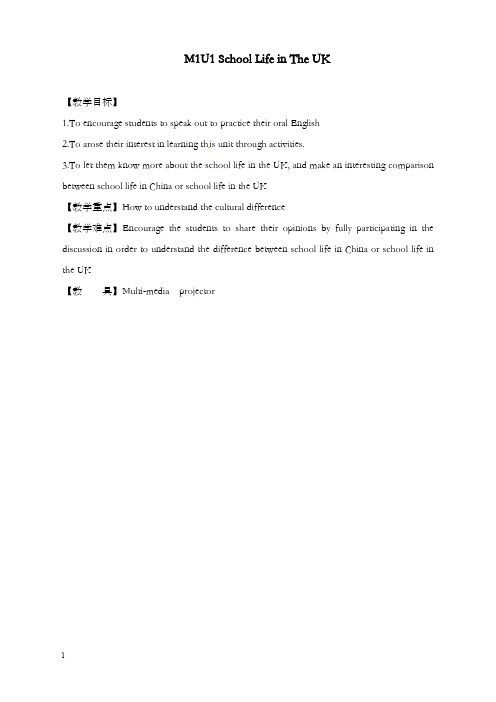
本句里的Going是动名词,它和后面的to a British high school for one year构成动名词短语作句子的主语。Go to a British high school本来是个动词词组,在go后面加上ing后,它就具备名词的特性可以在句子中充当主语、宾语或表语。
Find out the main idea of each paragraph and answer questions concerning the content of each paragraph.
Part1:
School hours:
1. Was she happy with the school hours? ______________
My(7)_______ teacher taught us English Literature.
Homework was not as (8)_______as what I used to get in my
old school.
My English (9)______a lot as I used English everyday and
be happy with对……很满意,相当于be pleased with
I'm pleased with his new house.
▲拓展:be happy to do sth乐于做某事
I shall be happy to accept your invitation.
3.This means I could get up a n hour later than usual as schools in China begin before 8 a.m.
牛津译林版高中英语模块1 Unit 1 School life Reading I 教学设计
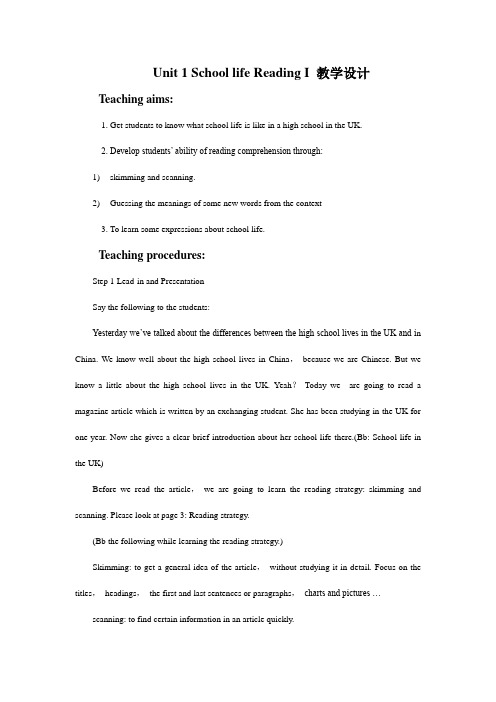
Unit 1 School life Reading I 教学设计Teaching aims:1. Get students to know what school life is like in a high school in the UK.2. Develop students’ ability of reading comprehension through:1) skimming and scanning.2) Guessing the meanings of some new words from the context3. To learn some expressions about school life.Teaching procedures:Step 1 Lead-in and PresentationSay the following to the students:Yesterday we’ve talked about the differences between the high school lives in the UK and i n China. We know well about the high school lives in China,because we are Chinese. But we know a little about the high school lives in the UK. Yeah?Today we are going to read a magazine article which is written by an exchanging student. She has been studying in the UK for one year. Now she gives a clear brief introduction about her school life there.(Bb: School life in the UK)Before we read the article,we are going to learn the reading strategy: skimming and scanning. Please look at page 3: Reading strategy.(Bb the following while learning the reading strategy.)Skimming: to get a general idea of the article,without studying it in detail. Focus on the titles,headings,the first and last sentences or paragraphs,charts and pictures …scanning: to find certain information in an article quickly.Look for key words and phrases,dates and numbers,etc.Step 2. Reading1. Skimming:Question: How does Wei Hua feel about her life in the UK?2. Scanning:1) Ask students to go through the three questions in part A and make sure that each of them know the meaning of each question.(A Woodwork class is a class in which students make something from wood.)Ask students to read the passage as quickly as possible and try to find answers to the three questions. Remind students only to focus on and identify the most important information.2) Ask student to reread the passage and complete Part C1 individually. Then ask some of them to give the answers to the questions in Part C13) Ask students to finish Part C2 individually. Then get some students to share their answers with the whole class. Ask them to say the true sentences to correct the false ones.3 GuessingAsk students to finish Part D individually. Tell them not to look up the meanings of the words from the wordlists in the textbook. Let them guess the meanings from the context. Then check the answers with the whole class.Step 3 New Words in this UnitStudy the new words appears from page2 to page 5 (from attend to immediately) at page 68.Step 4. Homework.1. Complete part E on page 5.。
高一英语Unit1《Schoollife》教案牛津译林版

牛津高中英语模块一(第1讲)【教学内容与教学要求】一、教学内容:牛津高中英语模块一Unit 1 (上)二、教学要求:1.掌握和校园生活有关的常用单词、词组与句型。
2.学会描述校园生活和学校设施。
High school is a time of discovery, learning and hard work!高中是探索、学习和辛勤劳动的时期Huge campus and low-rise building 学校面积大,没有高层建筑。
Twelve laboratories are available for different 个实验室可供不同试验使用。
Each room comes with its own bothroom and Internet access.每个房间都有自己的卫生间和英特网接口。
3.学习阅读技巧:skimming&scanning。
4.语法:定语从句(一)【知识重点与学习难点】一、重要单词:access achieve attend assembly article available average canteen club challenging context donate display experience extra graduate gym heading locker low-rise literature poster relax二、重点词组:class teacher 班主任 at ease with 和….相处不拘束 school hours学校作息时间 earn respect from 赢得…的尊敬 sound like听起来象 for free 免费 get a general idea 了解大意 as well as 除….以外, 也 key words 关键词 word by word 逐字逐句地 find one’s way around 认识路 develop an interest in 培养对….的兴趣 surf the Internet网上冲浪【难点讲解】1.What is your dream school life like?你理想中的学校生活是什么样子?这里dream表示心目中最理想的. 如 dream team (梦之队)。
【创新设计】高中英语 教师用书1 Unit 1 School life 牛津译林版必修1(江苏专用)

Unit 1 School life晨读在线1.假设你参加所在年级的英文写作比赛,请按如下要求完成一篇短文:简要描述右图内容,并点明主题;2.联系实际,表达该图带给你的启示。
注意:1. 词数不少于120个;2. 不能使用真实姓名和学校名称。
【范文欣赏】请进行完形填空(每空一词)One drop of water easily disappears,while the sea will never dry up;billions of drops form a river,and all rivers run into the sea. 1. One tree cannot stop the fierce sand storm or conserve water and soil,but the forest is composed of millions of trees,2. which can give creatures a home. One person's ability is limited,3. but human society has endless wisdom. And the masses have great creative power.4. In a word,unity is strength.5. The/This picture is simple but very instructive. It tells us a truth6. that society consists of individuals and individuals live in society. We are a huge family. Just7. as a proverb goes,united we stand,divided we fall. Therefore,we should work together and try8. our best to make a contribution to human society. (133 words)【名师点评】第一段对图画的内容进行了简单的描述,并点明了主题:团结就是力量(Unity is strength)。
Unit 1 《School life》教案4(牛津版必修模块1)
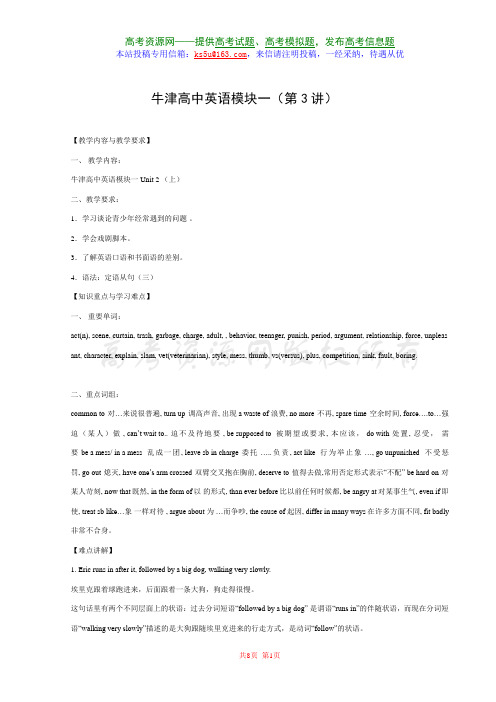
牛津高中英语模块一(第3讲)【教学内容与教学要求】一、教学内容:牛津高中英语模块一Unit 2 (上)二、教学要求:1.学习谈论青少年经常遇到的问题。
2.学会戏剧脚本。
3.了解英语口语和书面语的差别。
4.语法:定语从句(三)【知识重点与学习难点】一、重要单词:act(n), scene, curtain, trash, garbage, charge, adult, , behavior, teenager, punish, period, argument, relationship, force, unpleas ant, character, explain, slam, vet(veterinarian), style, mess, thumb, vs(versus), plus, competition, sink, fault, boring.二、重点词组:common to对…来说很普遍, turn up调高声音, 出现 a waste of 浪费, no more不再, spare time空余时间, for ce….to…强迫(某人)做 , can’t wait to.. 迫不及待地要 , be supposed to被期望或要求, 本应该, do with 处置, 忍受,需要 be a mess/ in a mess乱成一团, leave sb in charge 委托…..负责, act like行为举止象…, go unpunished不受惩罚, go out熄灭, have one’s arm crossed双臂交叉抱在胸前, deserve to值得去做,常用否定形式表示“不配” be hard on对某人苛刻, now that既然, in the form of以的形式, than ever before比以前任何时候都, be angry at对某事生气, even if即使, treat sb like…象一样对待 , argue about为…而争吵, the cause of起因, differ in many ways在许多方面不同, fit badly 非常不合身。
江苏省连云港高级中学译林牛津版高中英语必修一教案:unit1schoollifetask
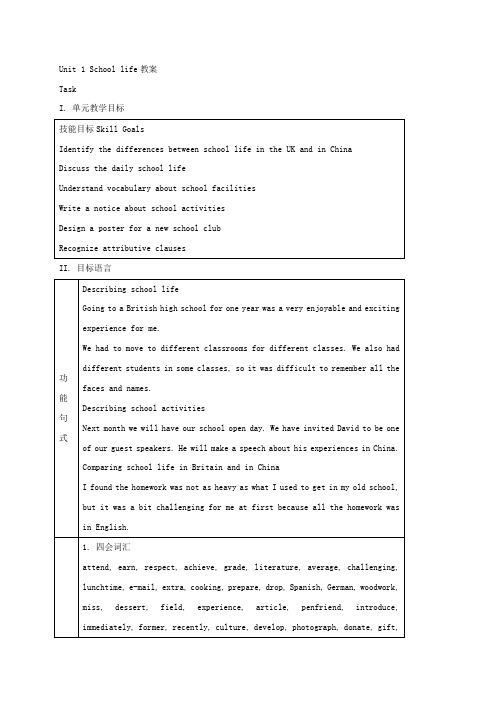
Unit 1 School life教案TaskI. 单元教学目标技能目标Skill GoalsIdentify the differences between school life in the UK and in China Discuss the daily school lifeUnderstand vocabulary about school facilitiesWrite a notice about school activitiesDesign a poster for a new school clubRecognize attributive clausesII. 目标语言功能句式Describing school lifeGoing to a British high school for one year was a very enjoyable and exciting experience for me.We had to move to different classrooms for different classes. We also had different students in some classes, so it was difficult to remember all the faces and names.Describing school activitiesNext month we will have our school open day. We have invited David to be one of our guest speakers. He will make a speech about his experiences in China. Comparing school life in Britain and in ChinaI found the homework was not as heavy as what I used to get in my old school, but it was a bit challenging for me at first because all the homework was in English.1. 四会词汇attend, earn, respect, achieve, grade, literature, average, challenging, lunchtime, e-mail, extra, cooking, prepare, drop, Spanish, German, woodwork, miss, dessert, field, experience, article, penfriend, introduce, immediately, former, recently, culture, develop, photograph, donate, gift,词汇display, kindness, guest, speech, flat, bookcase, attention, please, title, dynasty, cover, recent, professor, regret, inform, run, host, approve, broadcast, preparation, close, outing, continue,poet, generation, poem, select, require, scary, nature2. 认读词汇assembly3. 短语for free, pay attention to语法Introduction to attributive clausesRelative pronouns: that, which, who, whom, and whose重点句子1. I sat next to a girl whose name was Diane. P22. David was one of the most helpful studentsthat we ever had. P93. In 1998, he went to Oxford University where he got interested in Chinese culture. P94. Some of the cities in China which he likes most are Beijing, Shanghai, Harbin and Nanjing. P95. Most of the students that he taught have become his friends. P96. Some of the books were gifts that he got from his Chinese friends and students. P97. The paintings that David donated to the school are being displayed in the assembly hall. P98. During exam time we have a special programme that tells students the things they should or shouldn’t do for preparation. P18Ⅲ.教材分析与教材重组1. 教材分析本单元以School life为话题,旨在通过单元教学使学生了解英国校园生活的一些基本情况及中英两国校园生活的不同之处;学习并能运用表示校园设施的一些基本词汇;学习定语从句的基本概念及关系代词的用法;能就校园活动的话题展开讨论;能就校园活动情况向班任老师做出报告;学习通知的写法;学会设计以介绍学校俱乐部为主题的海报等。
- 1、下载文档前请自行甄别文档内容的完整性,平台不提供额外的编辑、内容补充、找答案等附加服务。
- 2、"仅部分预览"的文档,不可在线预览部分如存在完整性等问题,可反馈申请退款(可完整预览的文档不适用该条件!)。
- 3、如文档侵犯您的权益,请联系客服反馈,我们会尽快为您处理(人工客服工作时间:9:00-18:30)。
Senior Unit 1 School life (1) 教学设计
I.词语辨析:
1. below / under
below: 指(高度、职位、数量、年龄)在……之下”,(能力等)低于……
e.g. 100 meters below sea level,ten degrees below zero
below还可作后置定语,“下面的、以下的”
e.g. the figures below:下面的数字
under: 指“在垂直的下方”或“级别、数量、标准等低于……
e.g. Let’s sit under the tree. There are many children under 12 years of age.
2. know: 知道,明白
e.g. He knows exactly what he’s doing.
know of: 知道有,听说过……
e.g. I have never know of such a thing before.
know about: 知道……的情况,了解,知道
e.g. I know of him,but I can’t say I know much about him.
3. life / lives
一般来讲,当life 用作可数名词时,指
1)“一(几)条命”e.g. a life;
Three lives were lost in the accident.
2) 生活方式:e.g. one’s way of life;
Modern technology has changed our lives
其余情况下,life一般用作不可数名词,作“生活”解。
e.g. To him,money is his life.
Life is not easy for all of us.
4. missing / lost / gone
missing: 缺少的、失踪的、不在的
e.g. When I came back,my dictionary was missing.
There are some pages missing from the book.
注:missed:想念、错过,无“缺少的、失踪的、不在的”之意。
lost: 丢失的、迷路的、输掉的
e.g. The police are searching for the lost boy.
You’d better go to the Lost and Found to have a look.
gone: 遗失了的、无可挽回的
e.g. My youth is gone forever.
5. play / play with
play: 进行(有规则的、技巧的)体育/文艺比赛、弹奏乐器等。
e.g. Can you play tennis?Shall we play cards after dinner?
play with: 1)拿……玩,玩弄……
e.g. The boy is playing with his toys.
2) 和/与……人比赛,也可说成play sb.
e.g. I will play chess with Diana. = I’ll play Diana at chess.
6. prepare / prepare for
prepare: 准备……
e.g. Mother is busy preparing supper.
prepare for: 为……作准备
e.g. Please get reading and prepare for the test tomorrow.
preparation: make preparations (for)
7. attend / join / take part in / join in
attend: 出席(集会)、到(人多的)场合
e.g. attend a meeting (class,school,lecture….)
join: 参加团体、组织或某些人群
e.g. join the League ( the Party,Young Pioneer),join sb. in doing sth. take part in: 参加、参与(活动),成为活动的一分子
e.g. I will take part in the 1500-meter race.
join in: 参加活动
e.g. Many students joined in different activities
8. in the end: 最后,= at last,finally
to the end: ……到最后
e.g. The boy ran to the end of the 1500-metre race
by the end of…: 到……底为止(其主句一般用完成时态)
e.g. By the end of next month,we’ll have finished the repair work.
at the end of: 1) 在……结束的时候2)在……的末尾处
e.g. At the end of the meeting,the chairman made a speech.
A super market stands at the end of this road.
9. listen to / hear
listen to:听、倾听(指听的动作);hear:听到、听见(指听的结果)
e.g. Please listen to the teacher carefully in class.
Do the students at the back hear me?
We listened,but we could hear nothing.
我们常用:listen to / hear sb. do / doing sth.或listen to one’s doing sth. 句型。
